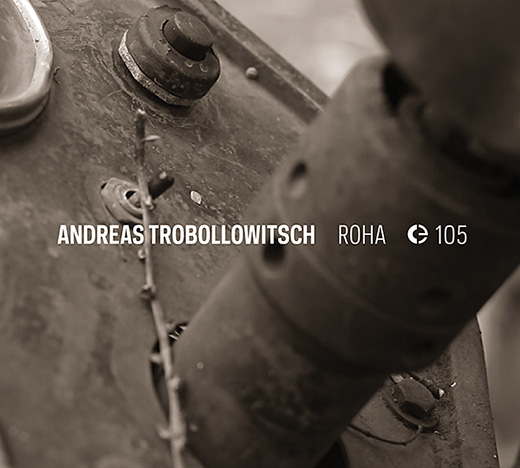
Andreas Trobollowitsch is an avant garde composer previously heard in the band Acker Velvet, whose debut was released in 2012. “Roha” is his only solo full length, as far as I can ascertain. The album is a concise 35 minutes, with 8 different pieces within its running time.
My initial impression of the album is that is a flurry of naked, at times laceratingly bright metallic textures, uncomfortably close to the ear: detuned strings, squeaking unoiled cranks, and scraped cymbals. It would seem each sound has been painstakingly adjusted into a tense and forlorn wailing interval. On display are the ringing and cold overtone structures of man’s materials, created as they were for practical purposes, with so many side effects.
The structure of the music is hypnotic, cyclical and droning, imperfect but effective loops created by patiently and meditative repeating the same physical actions. The intuitive pulse Andreas follows is irregular, but certainly present. Presumably overdubbing over his own free rhythm performances, there are many moments when a cluster of instruments stab in a rough cluster around the same moment, creating a seasick sense of deliberation.
His music inhabits a middle ground between the urban sound documentation of early industrial like Einsturzende Neubauten and Organum, and the sort of free improvisation that makes heavy use of found or prepared instruments. Organum is the closest comparison, who similarly had a preference in his 80’s work for layering mostly untreated recordings of scraping and ripping metal.
“Roha” is more of a work for percussion than any of Organum’s work, with such precisely timed, expertly minimalist fare as “Tuul”, making wonderful use of space with tympani hits which recede into a bed of soft crackling. The inevitable groan of a motor roars to life partway through the piece. Novel sound sources and cleverly sculpted timbres are presented in each piece, such as what sounds like a shortwave radio on “Ssbeat”.
The album’s final track “Klavirzinho” is a prepared piano piece that should satisfy fans of Cage’s most known sounds, with its choked, cold resonating twangs and chimes. As it plays, it seems to slip underwater, making for a softly murmuring melody of an album ending, a nice contrast to the clatter and scrape of the rest of the recording.
Though it is far from tonal, the album has been EQ’d and frequency balanced with a very high level of exactitude. Within its largely monochromatic world is a marvellous diversity and subtlety. No piece outstays its welcome, and together they form a suite that somehow retains its sense of spaciousness even in its its density of ideas. I find myself I could never get enough forward thinking percussion music like this, a clever and meaningful arrangment of textures often considered to be non-musical. Josh Landry
via Musique Machine
